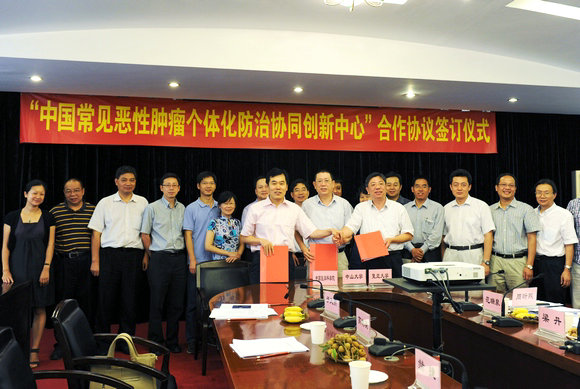The Signing Ceremony of Cooperative Agreement on “Collaborative Innovation Center for Personalized Prevention and Treatment of Four Common Malignant Tumors in China” Held in SYSU
Source: Office of Medical Science
Written by: Fan Ruiquan
On August 15, the signing ceremony of cooperative agreement on “Collaborative Innovation Center for Personalized Prevention and Treatment of Four Common Malignant Tumors in China” was held in SYSU. The Center is jointly established by Sun Yat-sen University Cancer Center (SYSUCC), Fudan University Shanghai Cancer Center (FUSCC), and Cancer Institute and Hospital, Chinese Academy of Medical Sciences “(CIHCAMS). Over 20 guests attended the signing ceremony including Xu Anlong, Vice President of Sun Yat-sen University, Li Jianchao, Secretary of SYSUCC Party Committee, Ma Jun, Deputy President of SYSUCC, Guo Xiaomao, President of FUSCC, and He Jie, President of CIHCAMS. The ceremony was moderated by Liang Dan, Director of the Office of Medical Science, Sun Yat-sen University.

The signing ceremony
According to the requirement of being “much-needed in the nation and first-class in the world”, the Collaborative Innovation Center for Personalized Prevention and Treatment of Four Common Malignant Tumors in China will develop collaborative innovations, aiming at the national important task of cancer prevention and treatment, putting together the advantageous resources of 5 state key laboratories in SYSUCC, FUSCC and CIHCAMS, centering on the scientific question of how to undertake personalized diagnosis and treatment effectively, enhancing the innovation capabilities of talents, discipline and research, and promoting the reform of mechanism and system. The Collaborative Innovation Center plans to cooperate on danger early warning model, molecular typing and personalized treatment of malignant tumors, and in about 10 years, build it into an academic highland of world-class cancer research, make China’s research on personalized diagnosis and treatment of the four malignant tumors (nasopharyngeal cancer, esophageal cancer, breast cancer and colon cancer) reach the advanced level in the world, increase early diagnosis rate and survival rate, reduce incidence and mortality, thus promoting the well-being of mankind.